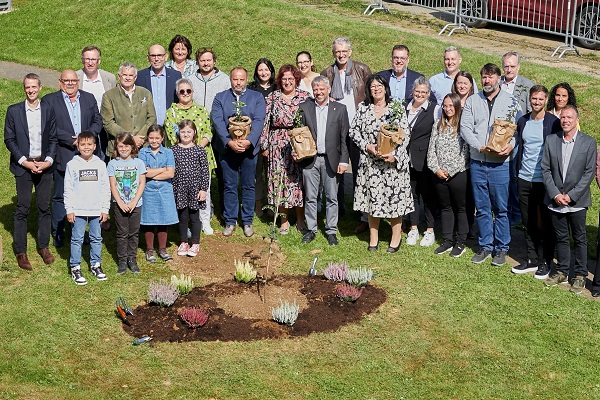 Um Bock primary school in Oberkorn (Differdange);
Credit: STUDION Photography
Um Bock primary school in Oberkorn (Differdange);
Credit: STUDION Photography
Luxembourg's Ministry of the Environment, Climate and Biodiversity has confirmed the winners of the call for municipal projects promoting greener school playgrounds.
On Wednesday 18 September 2024, Luxembourg's Minister of the Environment, Climate and Biodiversity, Serge Wilmes, congratulated the seven municipalities rewarded as part of the call for projects "Méi Natur an eise Schoulhäff" (more nature in our school playgrounds). This call for projects, launched in October 2023, aimed to encourage municipalities in their implementation of greening measures in school playgrounds, demineralising sealed surfaces to be replaced with trees, shrubs or grassy surfaces.
"Trees and green infrastructure are an added value for biodiversity and the best measure to prevent heatwaves in urban areas. Because of this, it is especially important for schools to have a lot of nature in order to offer our children a better quality of life in their everyday lives," stressed Minister Wilmes.
Contributing to a better water retention and lowering the temperature in cities and villages during heatwaves, greening in the urban environment is one response to the effects of climate change, noted the Environment Ministry. Demineralising and greening school playgrounds is also believed to help improve and increase the well-being of children and teaching staff at school.
The ministry added that it was thus "all the more important" to support municipalities that are committed to nature-based solutions. Seventeen municipalities responded to this call for projects by submitting concrete projects for the greening of a school playground. These projects are being carried out in a participatory approach with the stakeholders concerned (students, teachers, educators and parents' associations).
A jury composed of a representative of the municipal sector (appointed by Syvicol), two representatives of expert design offices in the fields of urban planning and landscaping (appointed by the Order of Architects and Consulting Engineers), a representative of the Mouvement Ecologique, a representative of the Ministry of Education, Children and Youth and a representative of the Ministry of the Environment, Climate and Biodiversity, selected seven winners who will receive financial support for the realisation of their project.
Rewarded projects
Having obtained the highest evaluation from the jury, the project of the municipality of Differdange for the redevelopment of the courtyard of the "Um Bock" primary school in Oberkorn was rewarded by Minister Wilmes. The municipality will benefit from financial support of €500,000 from the Climate and Energy Fund of the Ministry of the Environment, Climate and Biodiversity.
Developed thanks to the participation of the students, the teaching staff at the school, the educational team of the "maison relais" and the various services of the municipality, the redevelopment of this playground is set to "significantly" transform the current situation: the site will be almost entirely demineralised (-94%) and 31 trees will be planted to provide shade for the children.
"Here in Differdange, we have made a transition from a City of Steel to a City of Sports to a City of Nature. This is very important to us. We have beautiful nature here in Differdange and we want to actively bring it more and more into the heart of our community. We are about to go from grey to green and this is an important and necessary change. I am very proud that this philosophy has also found its way into our schools and that with this project we can take a big step in that direction. More greenery and more quality of life for our children," noted Guy Altmeisch, Mayor of Differdange.
The projects submitted by the municipalities of Sanem (Sanem primary school), Colmar-Berg (Colmar-Berg primary school), Mondercange (Pontpierre primary school), Schifflange (Lydie Schmit primary school), Mondorf-les-Bains (Grande-Duchesse Maria Teresa school complex) and Troisvierges (Troisvierges primary school) were also rewarded.
As part of the "Naturpakt" (nature pact) and measures to adapt to the effects of climate change, this call for projects is based on "nature-based solutions" and is expected to help increase our resilience to climate change. The ministry added that the greening of cities and villages allows us, on the one hand, to store water and thus better protect people and infrastructure in the event of storms or floods. On the other hand, in the event of periods of drought and heatwaves, green spaces help limit this warming and combat heat islands. In addition to these microclimatic benefits, there are various advantages such as improved air quality, the preservation and promotion of biodiversity in urban areas and, more generally, a gain in quality of life for citizens.
As such, Minister Wilmes announced that similar calls for projects will be launched in future.








